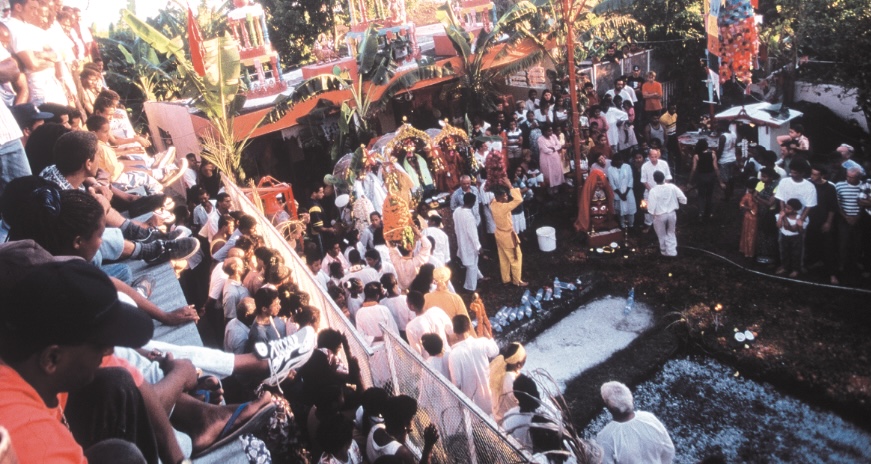By Gilles Flament
It is late afternoon in a small village on Reunion, a mountainous island nation about the size of Rhode Island. In the narrow courtyard of a Hindu temple, people are gathering around a pit dug two feet deep, twelve feet wide and 50 feet long. It’s full of smoking embers from a fire that has been burning down since sunrise. Two sweating men are raking the coals into a smooth bed, while a handful of women sprinkle flower petals all around.
In the distance the sound of drums heralds the arrival of more devotees. They are making their way toward the temple from a nearby pond where a purification ritual has just taken place. As soon as they arrive, they lift religious icons from the decorated procession carts they have been pulling and carry them to a temporary altar created in front of the fire pit. Three devotees balance tall, colorful flower cones, called carlons, on their heads. These carlons signify three Goddesses, named Kali, Mariyamman and Draupadi. Mariyamman, revered as the Goddess of Rain so precious to farmers, is enormously popular in Reunion and highly venerated in South India.
Immediately, the priest consecrates the pit and devotees begin to walk on the red hot embers. Their faces reflect great determination as their families gather around fervently chanting prayers. After crossing the smoking bed of glowing coals, the fire walkers put their feet into a small side pit filled with milk. There are no expressions of suffering on their facesÑjust great smiles of joy. It is said that Goddess Draupadi has laid down her hair to protect their feet.
Most fire walkers in French-speaking Reunion are Tamil. Their ancestors were the first to arrive from India to work on the island, located east of Madagascar, as cane laborers. Life at that time was difficult, but their adherence to the practices of their religion and culture kept them strong and united. Still today, this spirit of respect for ancestral tradition binds them together in a land where they areÑas they have always beenÑvery much in the minority among the 750,000 people in this Overseas Department (state) of France.
Before walking on fire, devotees undergo a 21-day preparation called karem. During this time, they abstain from drinking alcohol or having sexual relations. On the first day of karem, they receive a bracelet which signifies their formal commitment to performing the austerity successfully. Each evening thereafter they play out scenes from the Mahabarata, a famous India literary epic of religious importance to Hindus. On the last night, they stay awakeÑas did their ancestors, and theirs before themÑkeeping prayerful vigil in final preparation for their walk upon fire.
